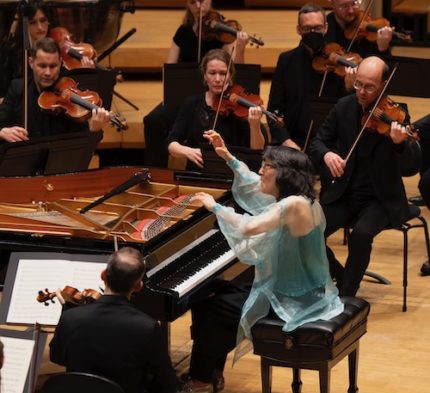Uchida leads luminous Mozart with Mahler Chamber Orchestra

There has been an informal and exceptional Mozart mini-festival taking place this month at Orchestra Hall. Pianist Martin Helmchen performed the composer’s Piano Concerto No. 17 two weeks ago under Herbert Blomstedt, and Dame Jane Glover made her CSO debut last week in a program featuring Mozart’s Symphony No. 29 and principal oboe William Welter in the Oboe Concerto.
Sunday afternoon the Symphony Center Presents series hosted the Mahler Chamber Orchestra with Mitsuko Uchida in two of Mozart’s late, great piano concertos.
The Mahler Chamber Orchestra is perhaps the world’s finest ensemble without a home base. Founded in 1997, the “nomadic collective” has a core membership of 45 or so musicians from 20 different countries, who come together for specific projects, filling out their roster as necessary. Eschewing a music director, the group rather favors long-term “artistic partnerships.” The first of these was with “founding mentor” Claudio Abbado, and Uchida is one of their current collaborators. To date they have performed to wide acclaim in over 40 countries spanning five continents.
Sunday’s performance made clear the group’s international reputation is wholly justified. Most impressive was the genuine chamber music quality of the performances that allowed for fresh revelations in the familiar scores of Mozart’s Piano Concertos Nos. 23 and 24. These works have rarely sounded as intimate and conversational as they did with Uchida and the Mahler players.
From the opening bars of the A Major Concerto No. 23, the orchestra played with a burnished, collective sonority ideally suited to this repertoire. Uchida’s understated leadership from the keyboard allowed one to appreciate how often in these works the melodic interest lies in orchestral lines in dialogue with the solo piano, rather than merely supporting it. The storied soloist was only physically at center stage, always attentive to the larger canvas surrounding her.
This aesthetic was on display throughout Concerto No. 23’s genial opening Allegro, the musicians entirely in sync and at ease with one another. The wind section glowed in the ensuing Adagio, leaving the impression that the movement is as much as a wind serenade as a piano feature. Uchida is at her considerable finest in this music, but never grabbed the spotlight when it was more suitably left on her colleagues. There were moments like the closing Allegro assai that almost ceased to sound like a concerto, so integrated were the soloist and her partners.
The same feeling prevailed in Concerto No. 24 in C Minor, a much more brooding work, though written a mere three weeks after its predecessor. Uchida’s conducting was minimal but highly evocative in the searching opening bars, and again, the collaborative aesthetic illuminated just what a wealth of ingenuity lies in these works.
There were moments in the opening Allegro where a little more fire from Uchida would have been welcome, though she was dynamic playing her own cadenza, which intelligently mined the movement’s themes. The central Larghetto sounded like a scene from one of Mozart’s operas, Uchida and the winds taking on different roles and emotional tenors. The intricate variations of the closing Allegretto received the same elevated treatment and brought the afternoon to a stellar conclusion. One wished Uchida and colleagues had simply continued with Concerto No. 25.
Between the two concerti the Mahler Chamber Orchestra strings offered four Fantasias by Henry Purcell, a switch from two Webern works that had initially been advertised. The late-Renaissance Fantasias are perfectly inviting consort music, though as their name suggests, rather wandering and formless. Concertmaster Mark Steinberg, of the Brentano Quartet, was an effective leader here, keeping the brief episodic movements on track, though the initially billed Webern would have made for a more compelling contrast.
Symphony Center Presents hosts pianist András Schiff in an all-Mozart recital 7:30 p.m. March 29 (rescheduled from April 3). cso.org
Posted in Performances




